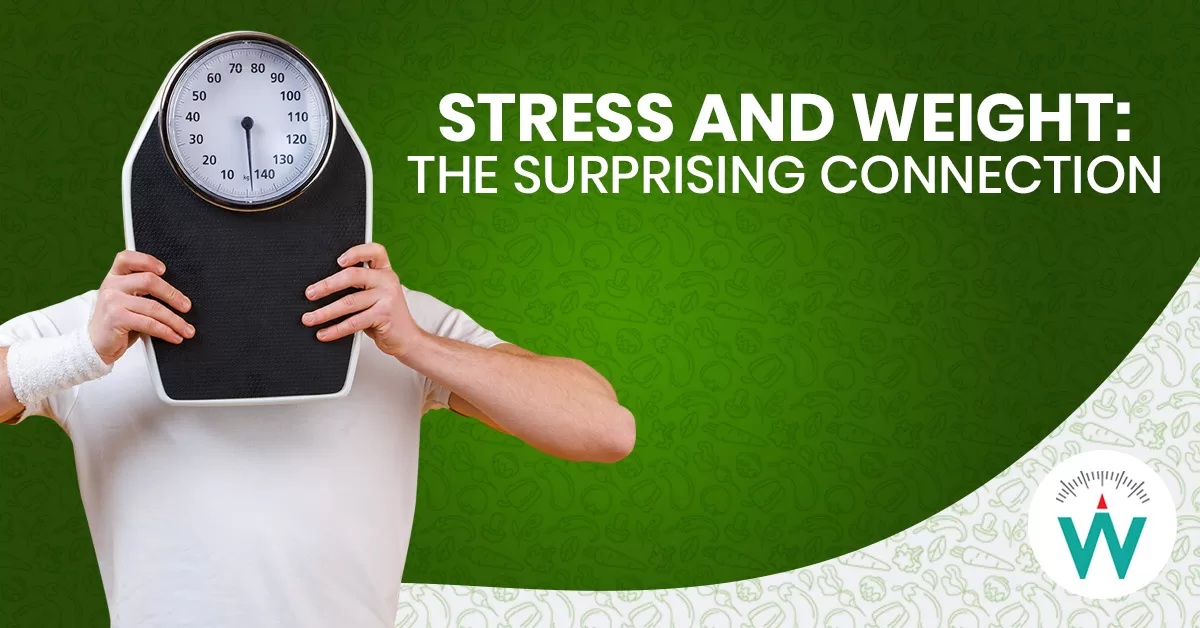The American Institute of Stress defines stress as “physical, mental or emotional strain or tension.” Stress is useful when it prepares a person to take on the task at hand— this is good stress. For instance, when you have a deadline and there is just the right amount of stress you feel so that you prepare and respond to the demand. Then there is also distress or bad stress– this is when there is so much stress that a person can feel exhaustion, panic, anxiety or anger. Even worse, too much bad stress can lead to burnout.
Did you know that chronic distress can lead to weight gain and other health problems? Stress is a part of daily life, but when it becomes chronic and is distressing, it can have a significant impact on our physical and mental health, including weight gain. The connection between stress and weight is a complex one, but understanding it can help us take steps to manage stress and maintain a healthy weight.
When we experience stress, our body releases cortisol, a hormone that prepares us to deal with the stressor. Cortisol can lead to an increase in appetite and cravings for foods high in sugar and fat. The increased hunger and food cravings paired with a stressful situation can lend people to seek food for the temporarily feelings of pleasure and comfort. This pattern of over eating as a means to cope with stress can contribute to weight gain.
Additionally, cortisol can increase the storage of fat in the body, particularly in the abdominal area. This type of fat, known as visceral fat, is linked to a higher risk of heart disease, diabetes, and other health problems.
Managing Stress for a Healthy Weight
Managing stress and building resilience in the face of stress is crucial for maintaining a healthy weight and overall health. Here are some ways to build resilience and manage stress.
- Practice self-care: Take care of your physical health by prioritzing sleep, eating balanced meals (minimize intake of ultraprocessed foods and added sugar) and exercising or moving regularly. Take breaks when you need them and make time for activities that bring you joy. Often our default mode is to burn through our personal fuel and negate these self-care practices when facing stress.However, doing so will lead to feeling more tired, anxious, and overwhelmed. This can make it harder to cope with stress and may even lead to more serious mental and physical health issues over time. I encourage you to resist the urge to stay up late, give into food cravings and throw your plans to move out the window during times of peak stress.In fact, when facing stress, I want you to actually prioritize taking care of yourself first. By practicing self-care by protecting our sleep, eating well and moving you will manage your stress and also succeed in accomplishing your goals because you will be rested and efficient.
- Develop a support system: When we face challenging times the support systems we have in place can make the biggest difference. Surround yourself with people who uplift you and provide emotional support. This can include friends, family or a therapist. It can be so helpful to discuss an issue with a good friend. I would also remind you to create boundaries and limit exposure from people who may be stress-inducing people.
- Reframe negative thoughts: Try to see the positive side of a situation and reframe negative thoughts into positive ones. This can help you feel more in control and less stressed.
- Set realistic goals: Set achievable goals for yourself and work towards them in small steps. This can help you feel a sense of accomplishment and build confidence.
- Practice mindfulness: Mindfulness is the practice of being present and fully engaged in the current moment. It can help reduce stress and increase resilience.
- Speak to yourself with self compassion: It’s important to speak to yourself with self-compassion because it can help build resilience and promote overall well-being. When we treat ourselves with kindness and understanding, we’re more likely to bounce back from challenges and setbacks. Avoiding harsh self-criticism or negative self-talk. Remember, you’re human. You can forgive yourself for past mistakes and be patient with yourself when struggling or feeling overwhelmed. Validate your emotions without judgment or criticism and allow yourself the time and space to heal and recover.
Remember that building resilience and managing stress takes time and practice. By incorporating these strategies into your daily routine, you can develop a stronger ability to cope with stress and bounce back from adversity.
Book a Free Medical Weight Loss Consultation and Take the First Step towards a Healthier You.




